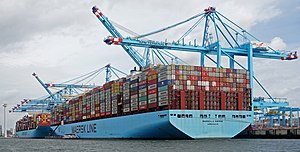
Back تلويث السفن Arabic Umweltschutz in der Seeschifffahrt German Impacto ambiental del transporte marítimo Spanish Itsasontzien kutsadura Basque اثر زیستمحیطی کشتیرانی Persian Impact environnemental du transport maritime French השפעות סביבתיות של ספנות HE Impatto ambientale della navigazione Italian കപ്പലോട്ടത്തിന്റെ പാരിസ്ഥിതിക ആഘാതം Malayalam Vervuiling door de scheepvaart Dutch
| Part of a series on |
| Pollution |
|---|
 |
The environmental effects of shipping include air pollution, water pollution, acoustic, and oil pollution.[1] Ships are responsible for more than 18% of nitrogen oxides pollution,[2] and 3% of greenhouse gas emissions.[3]
Although ships are the most energy-efficient method to move a given mass of cargo a given distance, the sheer size of the industry means that it has a significant effect on the environment.[4] The annual increasing amount of shipping overwhelms gains in efficiency, such as from slow-steaming. The growth in tonne-kilometers of sea shipment has averaged 4 percent yearly since the 1990s,[5] and it has grown by a factor of 5 since the 1970s.[citation needed]
The fact that shipping enjoys substantial tax privileges has contributed to the growing emissions.[6][7][8]
- ^ Walker TR, Adebambo O, Del Aguila Feijoo MC, Elhaimer E, Hossain T, Edwards SJ, Morrison CE, Romo J, Sharma N, Taylor S, Zomorodi S (2019). "Environmental Effects of Marine Transportation". World Seas: An Environmental Evaluation. pp. 505–530. doi:10.1016/B978-0-12-805052-1.00030-9. ISBN 978-0-12-805052-1. S2CID 135422637.
- ^ Cite error: The named reference
Schrooten1was invoked but never defined (see the help page). - ^ Kaminski, Isabella (22 June 2023). "Climate impact of shipping under growing scrutiny ahead of key meeting". The Guardian.
- ^ Rahim MM, Islam MT, Kuruppu S (2016). "Regulating global shipping corporations' accountability for reducing greenhouse gas emissions in the seas". Marine Policy. 69: 159–170. doi:10.1016/j.marpol.2016.04.018.
- ^ High Seas, High Stakes, Final Report. Tyndall Centre for Climate Change Research, Univ. of Manchester, UK. 2014.
- ^ "Fuel charges in international aviation and shipping: How high; how; and why?". World Bank Blogs. World Bank. 17 April 2013.
- ^ "Fuel taxation". Archived from the original on 17 December 2018. Retrieved 17 December 2018.
- ^ Keen, Michael; Parry, Ian; Strand, Jon (9 September 2014). "The (non-) taxation of international aviation and maritime fuels: Anomalies and possibilities". VoxEU. London: Centre for Economic Policy Research.
© MMXXIII Rich X Search. We shall prevail. All rights reserved. Rich X Search